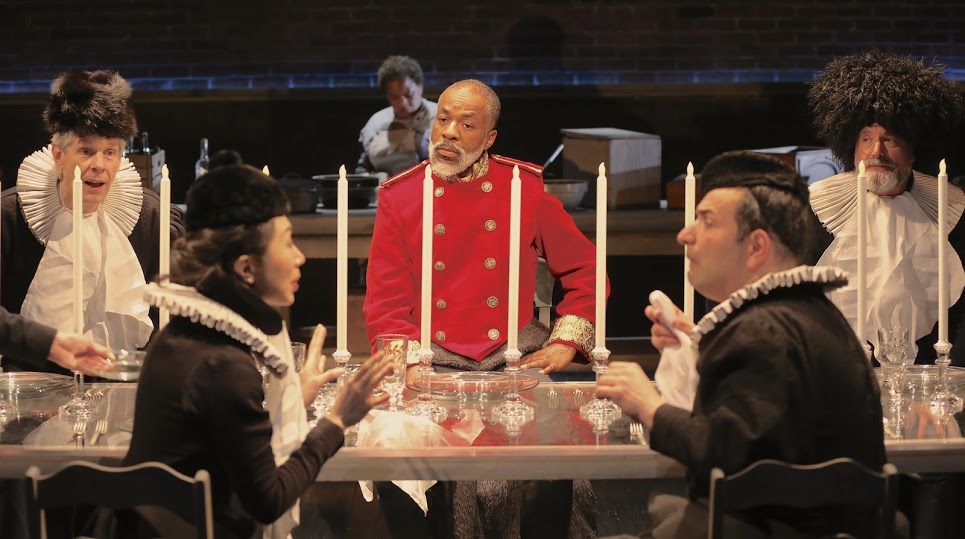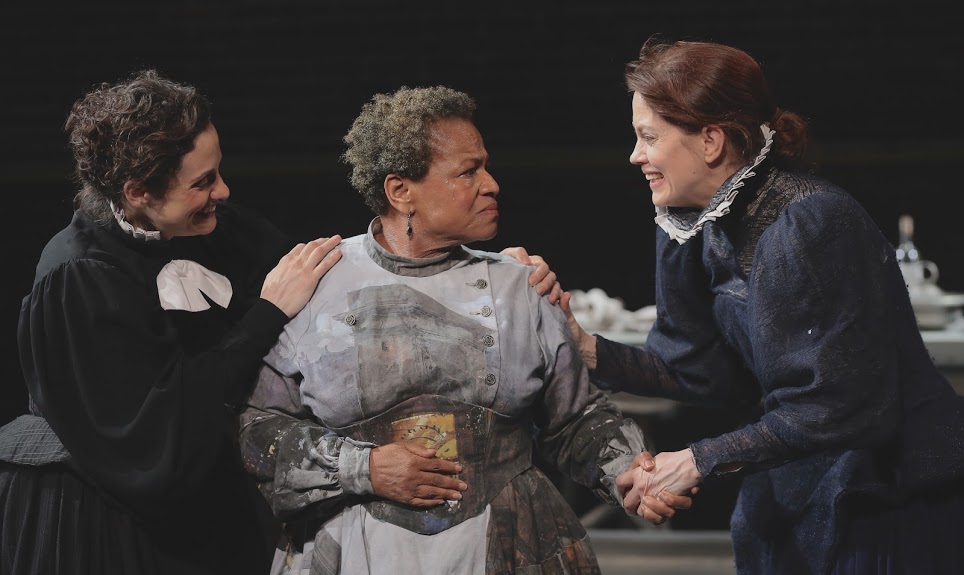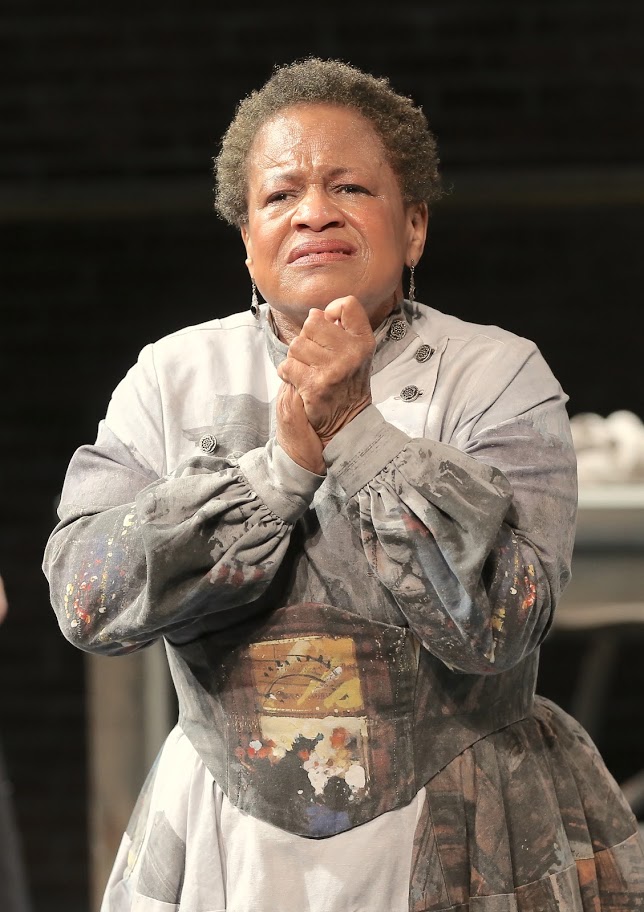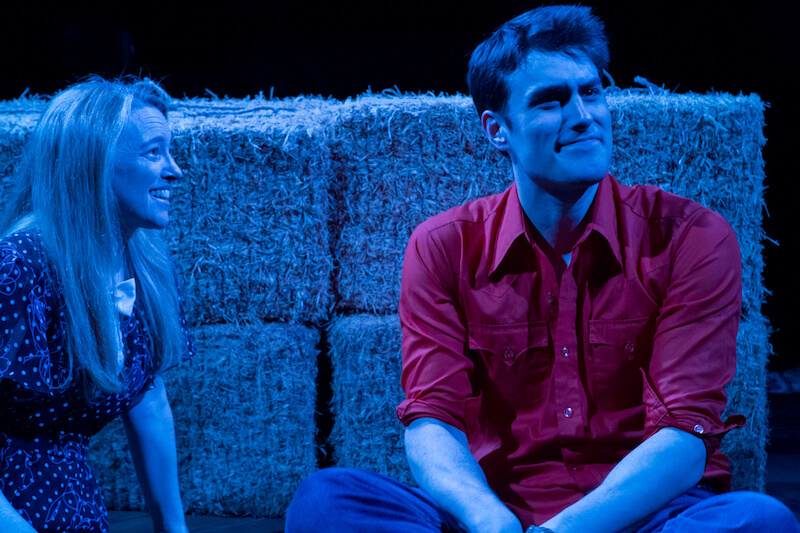Samuel L. Leiter Says:
Religion, artistry, politics, opera, romance, and, most distinctively, culinary achievement are among the many delicious ingredients in Babette’s Feast, Rose Courtney’s amiable stage adaptation of the 1950 short story of that name by Danish author Karen Blixen (a.k.a. Isak Dinesen).
Babette’s Feast, widely known from the Danish movie that won the 1987 Best Foreign Film Oscar, hews closely to Dinesen’s story, including moving its locale from the film’s Jutland setting to the original’s Berlevåg, a small, Norwegian coastal town. The production, conceived and developed by Abigail Killeen, who plays Martine, and imaginatively directed in devised theatre style by Karin Coonrod, comes to New York’s Theatre at St. Clements intact from its premiere at Maine’s Portland Stage Company.
Designer Christopher Akerlind creates a spare physical environment that serves for all scenes, with a long, wooden table running along the upstage wall, and several stall-like wooden walls extending at either side. His lighting takes advantage of the scenic starkness to fashion striking atmospheric effects.
With a few exceptions, like the eponymous feast, there are no props, the actors suggesting everything themselves in closely observed mime. They also create the sounds, like the loud pounding on an invisible door. A veritable concert of such noises collaborates to produce the effect of the feast being prepared.
Six actors in the versatile, nine-member ensemble are designated as Player 1 (Sturgis Warner), Player 2 (Jo Mei), and so forth, to cover their playing of multiple roles. Casting diversity allows roles to cut across conventional lines of race, gender, and age.
Oana Botez’s interestingly anachronistic costumes ignore the 19th-century period by placing most of the characters in early 17th century garb: white skull caps, black pantaloons, and tunics, and white neck ruffs. When an actor appears in a red military tunic the effect is suitably surprising.


Sturgis Warner, Jo Mei, Michelle Hurst (background) Jeorge Bennett Watson, Sorab Wadia, Steven Skybell
As the actors present the story, often breaking the fourth wall, they speak in carefully regulated dialogue, some of it choral, some in the third person; every movement, gesture, and tableau is preset with choreographic precision. Gina Leishman’s music, mainly hymnal, and Aretha Aoki’s dances have their lovely place as well.
The tale concerns a puritanical Lutheran community, dedicated to abandoning all worldly pleasures as pure illusion, the true reality awaiting them in the New Jerusalem. Their elderly leader is the Dean (Sturgis Warner), widowed father of two charitable daughters, Martine and Philippa (Juliana Francis Kelly). We first meet them in 1860, in their middle age, after their father has died and their community is riven with petty squabbling.
We then flashback 30 years, when they’re beautiful young women and the Dean, dependent on them, refuses the pleas of prospective suitors. A dissolute young lieutenant, Lorens Loewenhielm (Jeorge Bennet Watson), shows up and falls for Martine but feels so insignificant in her angelic presence that he gives her up and departs.
Then a famous French opera singer, Achille Papin (Steven Skybell), arrives, seeking a spiritual uplift from his depression. Despite his Catholicism, he’s welcomed by the Dean. So impressed is Achille by Philippa’s singing talent that he hopes to make her a star although declaring he only wants her to sing for godly purposes. A kiss during a duet from Mozart’s Don Giovanni leads Philippa, unable to accept her stirrings, to abandon Papin.
In 1871, after the Dean’s death, a stocky Frenchwoman, Mme. Babette Hersant (Michelle Hurst), comes to town. A Communard who lost her husband and son in France’s civil war, and now a political refugee, she bears a letter from Papin claiming she can cook. Babette is taken in and serves without pay for the next 12 years. She doesn’t disabuse the sisters’ doubts about her kitchen talents but when their usually tasteless meals begin to make taste buds blossom, fondness and respect replace distrust. As we’re told, “She had appeared to be a beggar; she turned out to be a conqueror.”
In 1883 Babette wins 10,000 francs in the French lottery, using the money not for herself but to prepare a spectacular French dinner, including vintage wines, in honor of the late Dean’s 100th birthday. Martine suspects Babette’s whipping up a witch’s Sabbath, even asking her friends to forgive the sinfulness of the coming feast and to remain silent about the delights of what they’re ingesting.
Thanks, though, to the unexpected presence of a visiting general—Martine’s former military suitor—the sensuality-deprived congregation begins to appreciate what it’s been missing, Babette’s onetime gastronomic celebrity is revealed, her heavenly artistry is acknowledged, quarrels are forgotten, and all are not only touched by grace but learn that everything is possible.
Babette’s Feast is rife with religiously oriented themes—guilt, suffering, resignation, vanity, mercy, and the like—but their emotional impact tends to be vitiated by the performance style, which dominates the experience. While some may come away moved, others will remember the production mainly for the tang of its presentation. Either way, there’s much to be digested from this hour and a half of artistically tasteful gastro-drama.
Photos: Carol Rosegg
Babette’s Feast
Theatre at St. Clement’s 423 West 46 Street, Run Time: 90 minutes – open run
























